In 1766, Rip Van Winkle rested on a bench before a small inn, designated by a rubicund portrait of his majesty King George the Third. His wife Dame had driven him out of home for his broken promises to repair the house. Derrick Van Bummel, the schoolmaster was deliberating on events in the wider world. Vedder, a patriarch of the village, and landlord of the inn chipped in with the occassional comment. An evening of human fellowship, there was no need to repair the House, and no need to get angry about the events roundabout. Situation normal.
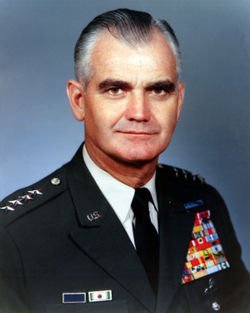 Westmoreland | In 1979, the cabinet of President William Westmoreland received a characteristically belligerent briefing from US Army Chief of Staff Frederick Carlton Weyand regarding the build-up of Soviet troops on the Afganistan border. The United States had began sending aid to anti-Soviet, Afghan Islamist factions on July 3, 1979. At the other end of the spectrum were apocalyptic warnings of a confrontation issued by journalist Stanley Shapiro. Writing in the New York Times in an article entitled A Time to Remember Shapiro inexplicably suggested that an altered history might require correction. |
| In Shapiro's view, by winning the Vietnam war, a militarised state had been guaranteed. No slight was left without a reciprocal response. This was a recipe for superpower confrontation. Better for the US to have been humbled by the war in Vietnam and then this ultra-belligerence would have been nipped in the bud, and Westmoreland sent off into a quiet retirement was Shapiro's message. | |
| In 1872, on board the Mary Celeste the crew under the command of Captain Benjamin Briggs reached the island of St Mary in the Azores – it was completely empty. Suggesting the island had been abandoned very recently, a number of strange discoveries were made including untouched breakfasts with cups of tea, washing hung out to dry and a cat found asleep on top of a locker. First Mate Albert Richardson joked that they had not seen a single human being since leaving New York City on November 7, 1872. Nobody laughed – it wasn't a laughing matter by then. |
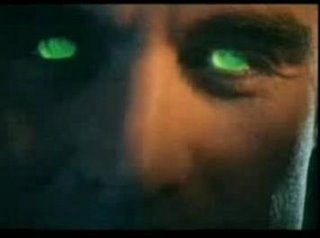 Snakeyes | In 1963, the strange being known as Snake Eyes is working hard to tie up loose ends. Even though the body count has already reached ten and all the principles are dead. Today's problem is a Dicta belt recording from a police officer's motorcycle that was escorting Kennedy’s motorcade. Listening to an incomprehensible string of guttural noises, it would be hard to image a more alien sounding conversation. |
| In 1963, a coded message from the CIA Station in Moscow is received and fully understood at KGB headquarters. The assassination of President Kennedy was to be considered an “internal” security matter. Khrushchev understood. What was implied but unwritten was the truth. Kennedy had been assassinated by security forces who had overthrown the government of the United States (actually as revenge for abandoning the CIA agents at the Bay of Pigs). The new government would not use the assassination as a pretext for a first strike on the Soviet Union, and sought no Cold War advantage from the action. | 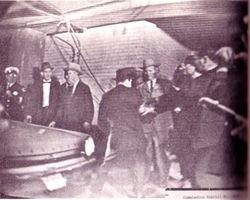 Alek dies |
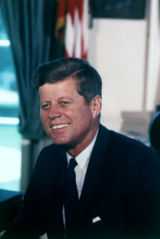 Kennedy | In 1963, the substitute body of President John F. Kennedy which was switched at the Parkland Memorial Hospital was buried at Arlington National Cemetery. Serious anomalies were discovered in 1967 whilst moving the body of President John F. Kennedy to a permanent burial place at Arlington National Cemetery. The true story of how the wounded President had been smuggled out of Dallas to be secreted at Hyannisport was later revealed by Nicholas A. DiChario in his masterful work 'The Winterberry'. |
| In 1950, the People's Republic of China joined the Korean War, sending thousands of troops across the Yalu river border to fight United Nations forces. UN Commander in Chief (Korean Peninsula) MacArthur raised a request to end the conflict by launching the bio-weapons surrendered to him in 1945 by Japanese General Otozoo Yamada's Bacteriological weapons research in Unit 731. Denied, he was angered at what he perceived to be Harry Truman's “limited war” and subsequently relieved of his command by the President. General Omar Bradley later speculated that MacArthur's disappointment over his inability to wage war on China had "snapped his brilliant but brittle mind." With the United States detonating the world's first hydrogen bomb on November 1st 1952, and “Brass Hat” back in the saddle again just twenty-eight days later, the world wondered just how the conflict would end; and vice versa. | 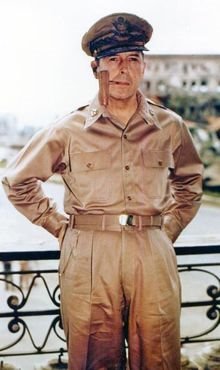 MacArthur |
No comments:
Post a Comment